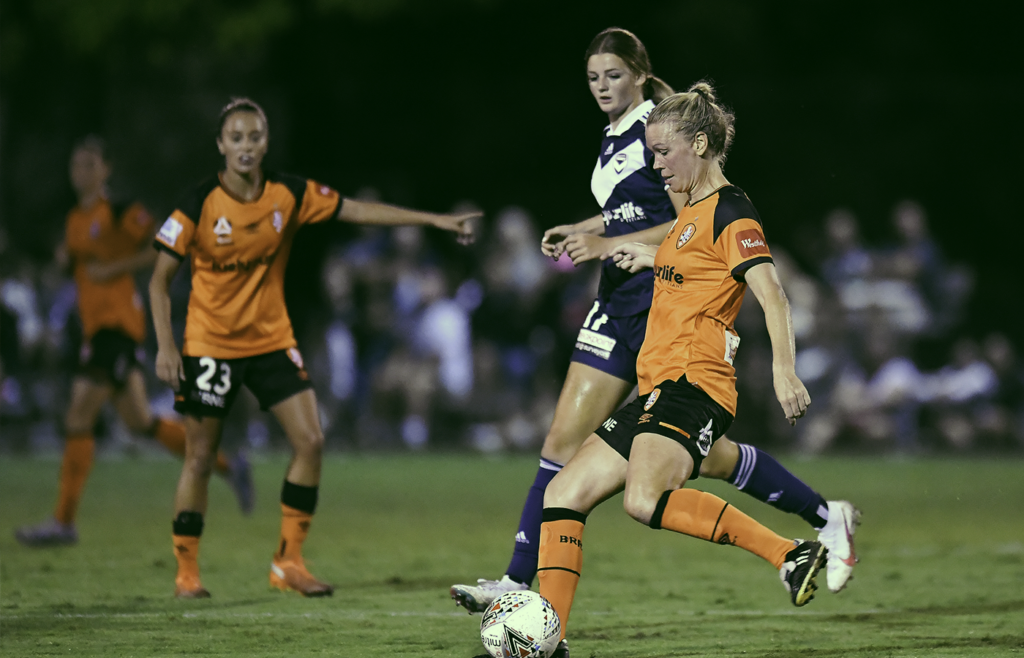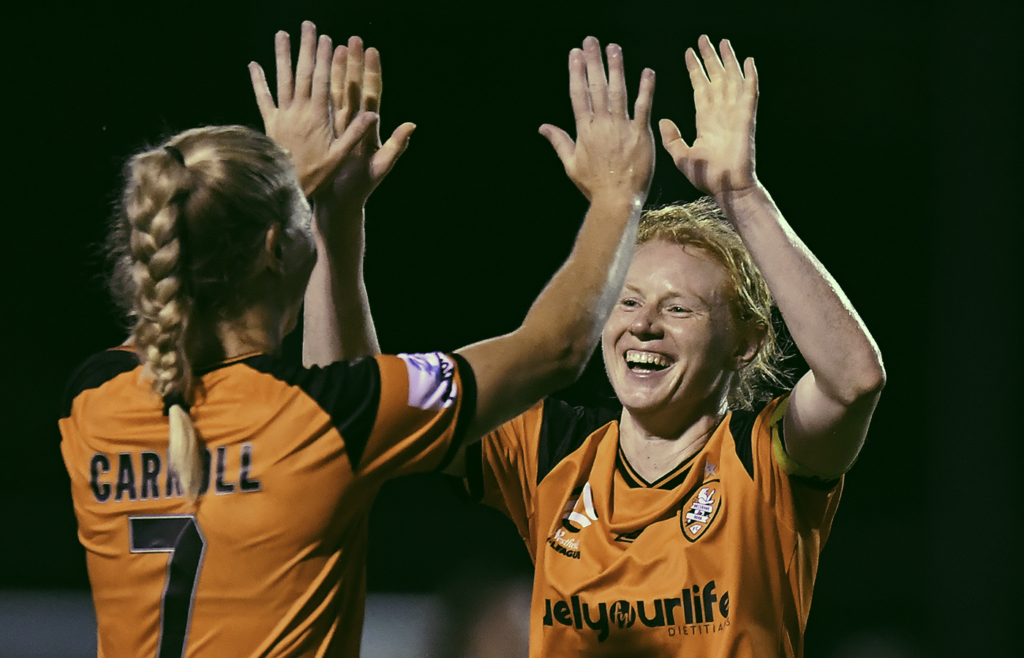Joe Gorman is a journalist and author. His first book, The Death and Life of Australian Soccer, was hailed as ‘one of the best and most important written on Australian sport’ by The Age, and long-listed for the 2017 Walkley Book Award. With the PFA, Joe will explore various issues impacting Australian football.

Words by Joe Gorman
For the past three months, Kim Carroll has been living a double life, juggling two jobs 4000 kilometres apart across different time zones. To the public, she is Kim Carroll the no-nonsense centre-back who plays for Brisbane Roar in the W-League. For most of the working week, though, she is Kim Carroll the operations manager who remotely manages a team of 14 people based in Perth.
Carroll, 33, returned to Brisbane this season knowing it would likely be the busiest year of her life. After five years in Perth, she had become a mainstay in the Perth Glory backline and settled into a full-time job with Veritas, a Western Australian-based security agency. The only reason she decided to come back to the Roar was because of the uncertainty created by the coronavirus pandemic, and the associated border challenges that the Glory could potentially confront.
Too old to quit her day job yet too young to stop playing the game she loves, Carroll made an arrangement with her coach in Brisbane and her boss in Perth to train in the morning, clock on at the virtual office around midday and finish late in the evening. The two-hour time difference between Brisbane and Perth has helped. But Carroll’s “normal” workday now sees her begin at 8am and finish at 8pm, including training, gym and video sessions before her day at Veritas begins. Weekends revolve around game day, which often involves interstate travel.

“I’m at an age where I needed to play,” explains Carroll matter-of-factly. “I can’t take a year off and I couldn’t risk Perth not having a team. When I was contacted about returning to Brisbane, I jumped on it. I thought it was a great opportunity to return home, play for a great club and hopefully go all the way this year.”
At the beginning of the season, Carroll was a key recruit in one of the most experienced sides in the history of the W-League. Five of the Roar players – Carroll and Claire Polkinghorne in defence, Katrina Gorry and Tameka Yallop in midfield, Emily Gielnik up front – had been named in the PFA Team of the Decade, with more than 500 appearances between them. All former or current Matildas, all Queenslanders, they provided a perfect foundation for the club.
This weekend, however, as Brisbane host Melbourne Victory in a home semi-final at Lions Stadium, the club’s famous five will have been whittled down to just two.
First to depart was Gorry, 28, who announced her pregnancy after four rounds. Next to go was Polkinghorne, 32, who signed for Swedish club Vittsjö just days after celebrating her 150th W-League game. And then Gielnik, 28, followed her captain to Vittsjö.

Roar coach Jake Goodship admits that Gielnik, the league’s leading scorer, and Polkinghorne, who is synonymous with the club, are virtually irreplaceable. “This season, I think they’ve been the best two players in their positions in the league,” he says.
Australian football fans are accustomed to seeing the game’s best talent leave the domestic competitions for greater opportunities overseas, and nobody can begrudge Gorry, Polkinghorne or Gielnik for their decisions. W-League advocates will rightly talk up the opportunity their departure offers younger players in the Roar squad.
But the loss of Polkinghorne and Gielnik, at this crucial stage of the season, is a glaring sign of the league’s limitations. Both of these women want to be part of the Matildas squad for the Olympic Games in June, yet the W-League regular season concluded this week after just 12 rounds. If they want to keep up their match fitness, moving abroad is their only realistic option.
Moreover, despite recent improvements in wages and conditions, W-League players are still reliant on short-term contracts that provide little security of employment. Even the most experienced Matildas still cannot truly carve out a full-time football career in Australia alone.
As a result, the W-League feels as if it is in a constant state of flux, which negatively impacts upon the fans, the coaches, the clubs and, in particular, the players.
“For players to only have six month contracts is tough,” says Goodship. “I use Kim Carroll as an example – she’s a superhero, what she does. She works full-time, she does a bit for us in an admin role, and she plays.”
Carroll is in a rarified position of having witnessed the complete transformation of women’s football over the past two decades. As a teenager, when she moved from Tully in Far North Queensland to Brisbane, Australia didn’t have a professional league to aspire to and the Matildas were best known for their nude calendar.
When she was part of the Brisbane Roar side that won the premiership and championship in the inaugural season of the W-League, in 2008–09, the competition was played over just 10 rounds. Two years later, as Carroll won a second championship with the Roar, the season had been extended to 12 rounds. Back then, the “clubs” were run by state and member federations and most of the players took the field for love, not money.
Since then, the A-League clubs have gradually taken responsibility for their W-League sides and the players have won the battle for a minimum wage and conditions. The Matildas have become one of the nation’s best-loved national teams and are now arguably a more marketable commodity than the Socceroos. Yet even as women’s sport has exploded over the past few years, the W-League is still played over just 14 rounds.
In part, this explains the ongoing exodus of Matildas from the competition – including Carroll’s teammates at the Roar. Australia’s best and brightest are seizing the opportunity to play and train as full time professionals in Europe, while the W-League is increasingly becoming a developmental competition. Carroll, who is part of the PFA Executive Committee, wants the league to be bold in the lead up to Australia co-hosting the 2023 Women’s World Cup.

“We still want to be producing young players that get game time at a high level here, but I think we also want to be a league that can compete with the likes of the UK, Sweden and Germany,” says Carroll. “Nothing is going to happen overnight, but the league has been around for 13 seasons and we haven’t really extended it. We still don’t have a full home and away season, and there’s no extended contracts – it’s season by season.”
Carroll knows that her own playing days will soon be over. As usual, she has flown under the radar this year. As one of the originals from the first season of the W-League, it is a little surprising that her performances haven’t garnered the same attention as other senior players, such as Canberra’s Michelle Heyman or Sydney FC’s Teresa Polias. In many ways, Carroll remains the forgotten stalwart of the competition. But her coach, at least, believes she still has plenty to offer.
“She’s been phenomenal this year,” says Goodship. “She’s one of the most experienced players in the league, but her performances this season have probably been her best for the past three years. If you look at her individual stats, they’re amazing – almost worthy of a Matildas recall.”
Of course, a return to the national team is unlikely – even if Carroll is one of the best centre-backs in one of the top teams in the W-League. She hasn’t played for the Matildas since 2014, and the latest squad for the upcoming friendlies against Germany and the Netherlands is exclusively drawn from overseas-based players.
Instead, Carroll is focused on the upcoming semi-final. Once this season ends, she will honour her boss and return to the office in Perth. At this point, it is too soon to say whether this year will be her last as a professional footballer. Winning another title with the Roar, though, would be a fitting reward for one of the W-League’s true believers.







